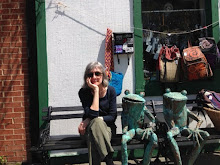What does it mean to be generous? We find a subtle teaching about generosity hidden in an unlikely spot in the Torah.
Near the end of the biblical book of Exodus, there are a series of detailed instructions for the creation of the portable sanctuary - the mishkan - that the Israelites will carry with them in the wilderness. Many readers skim over this section because it looks like an artisan's technical manual rather than the dramatic stories we are accustomed to reading in the Torah thus far. But look more closely....
The very first instruction for the sanctuary: "God spoke to Moses, saying: Speak to the children of Israel, that they may take me a gift; from every person whose heart moves them, you are to take my gift. And these are the gifts: gold, silver, copper, different color yarns, linen, goats hair, animal skins, wood, oil, incense.... And let them make me a holy sanctuary and I will dwell among them."
Two surprises in the language: First, notice that the original Hebrew text of the Torah doesn't say "Speak to the children of Israel, that they may BRING me a gift" - it says "Speak to the children of Israel, that they may TAKE me a gift." Why the odd language?
Here's one interpretation. This language reminds us that all these things already "belong" to God! The Israelites are taking to God that which is already God's. In other words, human ownership is ultimately illusory.
Our sages therefore suggest that what the people are really bringing is not the material goods themselves, but rather their hearts - their generosity, their willingness to work for a common cause.
The Torah wants us to get it that we are the vessels or conduits through which the bounty of the world gets shared. When we are generous, when we give something towards a common purpose, ideally it's not about us - the Ego - but it's actually about letting go of the Ego. The things we tend to think of as "ours" are ultimately just on loan to us.
Second surprise in the language: The Torah doesn't say that the goal of building the sanctuary is so that God will then dwell in the sanctuary, but it says "let them make me a holy sanctuary and I will dwell AMONG THEM." Why the odd language? God doesn't need a house to sit in! The point of having the holy sanctuary is not for God to be in the sanctuary, but rather for God to be among the people.
When we are generous in building community, we are connecting to other people and to something bigger than ourselves, and it is in this sense of connection that God's presence may be felt. In acting generously - acting as conduits - we benefit both in the "taking" and in the "bringing."
Near the end of the biblical book of Exodus, there are a series of detailed instructions for the creation of the portable sanctuary - the mishkan - that the Israelites will carry with them in the wilderness. Many readers skim over this section because it looks like an artisan's technical manual rather than the dramatic stories we are accustomed to reading in the Torah thus far. But look more closely....
The very first instruction for the sanctuary: "God spoke to Moses, saying: Speak to the children of Israel, that they may take me a gift; from every person whose heart moves them, you are to take my gift. And these are the gifts: gold, silver, copper, different color yarns, linen, goats hair, animal skins, wood, oil, incense.... And let them make me a holy sanctuary and I will dwell among them."
Two surprises in the language: First, notice that the original Hebrew text of the Torah doesn't say "Speak to the children of Israel, that they may BRING me a gift" - it says "Speak to the children of Israel, that they may TAKE me a gift." Why the odd language?
Here's one interpretation. This language reminds us that all these things already "belong" to God! The Israelites are taking to God that which is already God's. In other words, human ownership is ultimately illusory.
Our sages therefore suggest that what the people are really bringing is not the material goods themselves, but rather their hearts - their generosity, their willingness to work for a common cause.
The Torah wants us to get it that we are the vessels or conduits through which the bounty of the world gets shared. When we are generous, when we give something towards a common purpose, ideally it's not about us - the Ego - but it's actually about letting go of the Ego. The things we tend to think of as "ours" are ultimately just on loan to us.
Second surprise in the language: The Torah doesn't say that the goal of building the sanctuary is so that God will then dwell in the sanctuary, but it says "let them make me a holy sanctuary and I will dwell AMONG THEM." Why the odd language? God doesn't need a house to sit in! The point of having the holy sanctuary is not for God to be in the sanctuary, but rather for God to be among the people.
When we are generous in building community, we are connecting to other people and to something bigger than ourselves, and it is in this sense of connection that God's presence may be felt. In acting generously - acting as conduits - we benefit both in the "taking" and in the "bringing."
